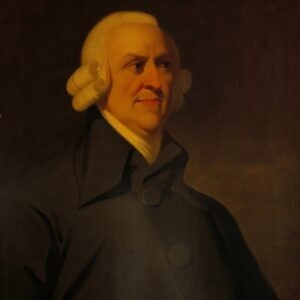Adam Smith was born around June 16th, 1723 in Kirkcaldy. That is a village near the Scottish capital of Edinburgh. His father, also Adam Smith, a prosecutor, and advocate died two months before his son was born. He has studied social philosophy at the University of Glasgow and literature at Balliol College in Oxford. Moreover, he lectured at the University of Edinburgh. Additionally, the Scottish Enlightenment philosopher and economist David Hume was his closest coworker.
Experts frequently dub Adam Smith the father of modern economics and modern capitalism. In his first book, The Theory of Moral Sentiments (1759), Smith proposed the invisible hand and advocated for laissez-faire. Furthermore, one of Adam Smith’s greatest works, The Wealth of Nations (1776), lays the basics of the free market theory and the theory of division of labor. Regarding sales, The Wealth of Nations was an immediate success. Despite that, the general reception of the book was reluctant. However, since then the book proved to be one of the most significant economic publications.

✟ July 17, 1789, Edinburgh, Scotland
During the years 1774 and 1776, Adam Smith traveled through France and Switzerland. Throughout these travels, he worked with the likes of French Enlightenment philosopher Voltaire or French economist and founder of the Physiocracy school François Quesnay. Furthermore, he also met with one of the Founding Fathers of the USA, Benjamin Franklin.
Further accomplishments
However, we know very little about Adam Smith’s personal life. However, we are sure that he was never married. Moreover, he gained an FRSA (Fellow of the royal society of arts) title after being elected a fellow of the Royal Society of London in 1773. Later, in 1783, Adam Smith was also elected a fellow of the Royal Society of Edinburgh. Further, his work influenced many future thinkers. Among them are Thomas Paine, John Stuart Mill, or Milton Friedman. Adam Smith died after a painful illness on July 17th, 1790 in Edinburgh.
“No society can surely be flourishing and happy of which by far the greater part of the numbers are poor and miserable.”
Adam Smith
